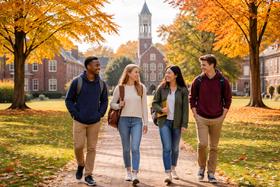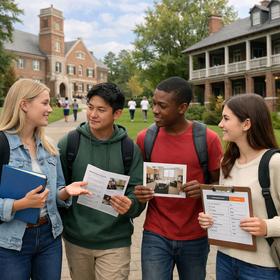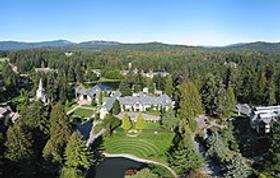Read more details about Pomfret School on their 2026 profile page.
Reflections and Advice:
1.) What do you think makes your school unique relative to other boarding schools?
I've had a very wide window through which to view my Pomfret experience.Looking back time and again, my Pomfret years have proven to be the crucible of my adult personal and professional lives. The faculty, staff and diverse student community during my time on The Hill were instrumental in giving me the freedom to find my interests, beliefs, and passions -- while providing a backstop to mitigate the impact of inevitable adolescent pratfalls.I look back fondly on my Pomfret years and discover anew each day the value of who I met and what I learned there.
2.) What was the best thing that happened to you in boarding school?
My mind and, well, soul were opened. I learned to appreciate the beauty in everything--Ubu plays, punk rock, opera, sketch comedy. I came to appreciate and experience other kids' perspectives, cultures, and life-experiences. I had never fully encountered kids from poor backgrounds whose prospects (before Pomfret) were limned by America's racial and economic power structure. Knowing kids from neighborhoods whose names were shorthand for "them" (Spanish Harlem, inner-city New Haven, etc) applied a human dimension to cultures and experiences I knew only from the institutional media of the time. Pomfret acquainted me with the notion of "chance," as in, being born who I was, where I was from, and what material advantages I had (but didn't appreciate) was nothing more than luck. If I were to be "extraordinary," it would have to be the result of what I did and how I treated others. One thing I never expected as a kid a Pomfret would be growing up to be a parent who valued exposing my own kids to worlds beyond their own.
3.) What might you have done differently during your boarding school experience?
Too many things to list. Advice to kids: be open-minded. Accept and embrace the tremendous opportunity you've been granted. Actively seek to make other kids' boarding school experiences enriching and fun. Recognize other students might be having the same doubts as you; similar troubles. Don't accept things as they are. Seek help from faculty. Be inquisitive. (e.g., speak out if you don't understand something. A surprising number of kids have processing- or anxiety disorders. Hopefully, faculty today have better training to recognize these things and guide students to seek assistance.
4.) What did you like most about your school?
See above. It was idyllic. I was transformed -- or at least I was taught how to mine the raw materials of everything I do, see, and value and process them over a lifetime. "Certa Viriliter - Strive Valiantly."
5.) Do you have any final words of wisdom for visiting or incoming students to your school?
Too long ago. The fried clam rolls from the cafeteria were perfection.
Academics:
1.) Describe the academics at your school - what did you like most about it?
Probing, insightful, at times iconoclastic course curricula. Biblical Themes in Literature, taught by the school's chaplain; a critical overview of the US involvement in southeast Asia, taught by a faculty member with experience in the conflict's formative years. Tremendous, sensitive academic support -- a tacit recognition of the needs of students with undiagnosed learning disorders/disabilities (it was the '80s -- parents oftentimes shied away from acknowledging their kids' challenges). Science teachers with infective passion for their disciplines. Students could find groups of like-minded classmates for debate and discussion about learning in and out of classroom settings. Instructors challenged me 1-on-1 and brought out both competency and passions that serve me to this day.
Athletics:
1.) Describe the athletics at your school - what did you like most about it?
For a small school, Pomfret had a wide variety of competitive and non-competitive sports options. The school carried several levels in soccer, hockey, tennis, and other major team sports, encouraging students to learn and develop skills. Women's sports were given parity as much as possible (again, it was the '80s). There was a bit of a jock culture, but it did not dominate the student experience. Once again, more than 40 years later, I still participate in the games I learned and practiced as a secondary school student.
Art, Music, and Theatre:
1.) Describe the arts program at your school - what did you like most about it?
Excellent. The visual arts director was a talented artist who could connect with students who either lacked artistic talent, or had never had their talents recognized and nurtured. Music and theater were pillars of the student experience. Drama and musical productions were full-campus affairs. The annual Gilbert and Sullivan society productions brought out the unique "shaggy dog" qualities of Pomfret, helping to create a bridge from America's stratified past to a more socially egalitarian and inclusive future.
Extracurricular Opportunities:
1.) Describe the extracurriculars offered at your school - what did you like most about it?
Not much of a joiner. I regret this. Plenty of opportunities to work the Tuck. A/V society in the formative days of video was a great stepping stone to the media, where I've worked since college. Student identity societies -- Asian Student groups, Student African-American Society, etc. were a visible part of campus life that broadened my perspectives (I was a kid from a VERY ethnically and socio-culturally homogeneous region of the Northeast.)
Dorm Life:
1.) Describe the dorm life in your school - what did you like most about it?
Dorm life anywhere is a mixed bag. I learnt the value (ex-post-facto) of accepting people for who they are and not taking their adolescent responses to stressful and unfamiliar situations as personal affronts. In hindsight, I had fun! Not much flexibilty in room arrangements in 3d and 4th forms, but the option to live in houses or smaller dorms as an upper-former was a wonderful experience. Zero late-night food access. Students would organize pizza delivery runs.
Dining:
1.) Describe the dining arrangements at your school.
Good food. Lovely dining facility. Compulsory table-waiting duties weren't nearly as bad as they sound. Rotating regular assignments to dine at tables with faculty families deepened the connections between students and the school.
Social and Town Life:
1.) Describe the school's town and surrounding area.
Beautiful, bucolic, bland. Students drank a lot. Winters were long, but fall and spring were glorious.
2.) Describe the social life at your school - what did you like most about it?
Lots of kids from interesting backgrounds. I was exposed to cultures and experiences I never would have encountered elsewhere. The 1 1/2 hours after study time were a glorious, frenzied collage of impromptu games at the gym, occasional "must-see" TV events in the Tuck, or just socializing with fellow students and blowing off steam.
Read more details about Pomfret School on their 2026 profile page.
Alumni Reviews Review School
Review
Description
I've had a very wide window through which to view my Pomfret experience.Looking back time and again, my Pomfret years have proven to be the crucible of my adult personal and professional lives. . .
What makes Pomfret stand out, in my experience, is how skilled it is at maintaining its reputation through image management. When prospective students visit, the school organizes a full performance—students are coached to act cheerful. . .
Pomfret is unique because of the focus on STEM topics in all aspects of learning. Pomfret has shifted its use of technology in the classrooms to reflect the importance of math and engineering into the. . .
Show more reviews (7 reviews)
Recent Articles

Boarding School Glossary: Key Terms for Families
A comprehensive 2026 boarding school glossary explaining key terms, traditions, academics, and student life for parents and students.

Choosing a School: Comparing Boarding Schools in 2026
Learn how to compare boarding schools in 2026 with data-driven strategies, campus visits, and key academic and financial factors.

How Boarding Schools Are Adapting Post-Pandemic
Explore how boarding schools are adapting to post-pandemic education in 2026 through wellness, hybrid learning, and global innovation.





